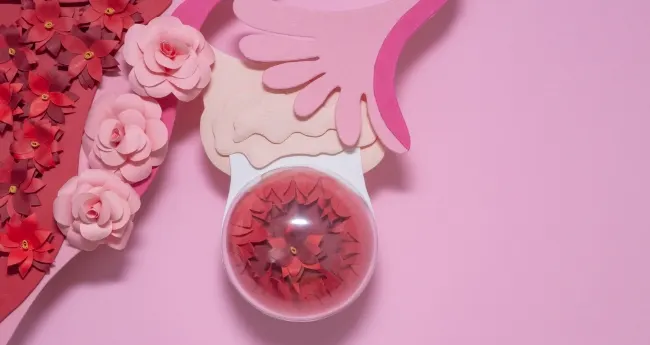Stringy Period Blood: Is it a cause of concern

At some point, you must have noticed stringy period blood while changing your pad and wondered ‘why is my period blood stringy? For most of us, it would have surely been unexpected and confusing, or even scary!
However, it’s completely normal to have period blood look a little clumpy or stringy at times. Let us understand whether stringy blood clots during period is normal or is it something that we ought to be alarmed by.
Stringy period blood: Why the consistency?
In most cases, if you notice stringy period blood, it shouldn’t be worrisome. But the question remains,’ what does stringy period blood mean?’ More often than not, when you notice a stringy consistency, it means there’s a blood clot that is leaving your uterus. It is okay and normal to notice small blood clots. These should be no bigger than the size of a quarter.
To go back to the basics, your period is the shedding of your uterus lining through the vagina. And period discharge includes this discarded uterine lining, blood, and vaginal fluid. For most of us, the first couple of days of a period are the heaviest. And it’s normal to notice various consistencies in your period discharge.
When should you be worried about stringy period blood?
We have learnt that it is normal to have small blood clots in our period discharge, especially in the first two to three days of our period, when the flow is at its heaviest. However, experts suggest that there could be a reason or an underlying medical condition when you have other symptoms such as a flow that lasts for more than seven days coupled with blood clots.
Below are some other symptoms that you should be on the lookout for.
- If you have a fever during period
- If the blood clots you pass appear larger than a quarter
- If your flow is heavy enough to fill a tampon or sanitary pad every hour
- If your period or bleeding lasts longer than seven to 10 days
- If you notice bleeding and spotting in the middle of your menstrual cycle
If you experience any of the above symptoms, you must contact your doctor immediately.

It is important to stay prepared for your period at all times with Always’ sanitary pads. Try Always Maxi Thick pads for ultimate protection and comfort. Its extra absorbent core is designed to absorb liquid, so you don't feel a thing. You can stay dry and protected all day, with its clean and dry topsheet. Armed with high flexi wings, it ensures that the pad stays in place no matter how active you are.
Other than sanitary pads, you also have the option of using tampons. Explore the range of tampons by Always’ Tampax. These are soft, highly-absorbent, and gently hold menstrual discharge to minimise the risk of leakage. Try the Tampax Compak tampons which have innovative absorption channels that quickly lock in the liquid and hold it in for longer. Its protective skirt at the bottom of the tampon eliminates the risk of leakage.
Possible causes of stringy period blood
While it is normal to have small blood clots, because of which you notice stringy blood clots during your period, it is not alright to constantly pass large blood clots along with a heavy period flow. This could signal other serious conditions such as:
1. Uterine fibroids
Any noncancerous growth of the uterus is known as uterine fibroids. Generally, the symptoms of this condition are heavy bleeding accompanied by pelvic pain, and long periods.
2. Endometriosis
The is a condition that occurs when the tissue that is present in the lining of the inner uterus, known as the endometrium, grows outside. This growth can also spread to other pelvic organs. The symptoms of endometriosis are heavy bleeding, extremely painful periods and intercourse, and in some cases, even infertility.
3. Adenomyosis
When the endometrial tissue grows inside the uterine muscular walls, it is results in adenomyosis. It typically leads to a heavy flow and longer periods coupled with pain in the pelvic region and cramping.
4. Uterine polyps
Uterine polyps are the endometrium overgrowth which attaches on to uterine inner walls. The overgrowth can reach all the way into the cavity. This condition often leads to heavy and irregular bleeding. It is important to note that even though uterine polyps are benign, there is a risk that they may turn cancerous.

5. Polycystic ovary syndrome (PCOS)
An imbalance in hormone levels and other hormonal disorders results in higher levels of male hormones. This leads to PCOS and those affected by this condition can develop small cysts in their ovaries. Some commons symptoms of PCOS include weight gain, acne, hair thinning, and irregular periods.
6. Other hormonal imbalances
Other conditions caused due to hormonal imbalances such as menopause and perimenopause, hypothyroidism, etc. can also lead to fluctuations in menstrual cycles accompanied by blood clots.
7. Miscarriage
If you notice blood clots that are unusually large, it could be a sign of miscarriage. It is possible for a miscarriage to happen even before the woman is aware of the pregnancy.
8. Cancer
Although rare, period blood clots can also lead to cervical or uterine cancers.

When to see a doctor
Not every period is the same and it’s normal for it to differ every month too. This difference could be in the length of your period, its flow, the symptoms that you experience, etc. However, if you notice certain changes consistently, for a long period of time, it is of utmost importance to bring it to the notice of your doctor. Some of these changes or symptoms include:
- Fatigue, shortness of breath, or if you bruise easily – all these could indicate anaemia
- Cramping experienced during your period increases
- If you experience pain or bleeding during or after intercourse
- Blood clots that appear to grow larger in size as your period progresses
- Heavy periods to the extent that you soak through pads after every hour
- Bright red stringy, watery period blood
- Longer period that increases or continues after 7 days along with heavy period bleeding.
If you notice stringy period blood-like discharge during pregnancy or if there’s a chance that you may be pregnant, you must get medical attention immediately. The discharge would look bright red, and watery coming from your uterus.
Takeaway
It is normal to have stringy period blood every now and then since they are caused due to small blood clots. However, if you notice large blood clots or any of the above symptoms along with clots then you must talk to your doctor immediately.
Disclaimer:
Please note the date of last review or update on all articles. No content on this site, regardless of date, should ever be used as a substitute for direct medical advice, diagnosis or treatment from your doctor or other qualified clinician. Always is committed to ensuring that all of our products meet rigorous safety standards; Always pads prioritize safety, protection and comfort of its consumers.




